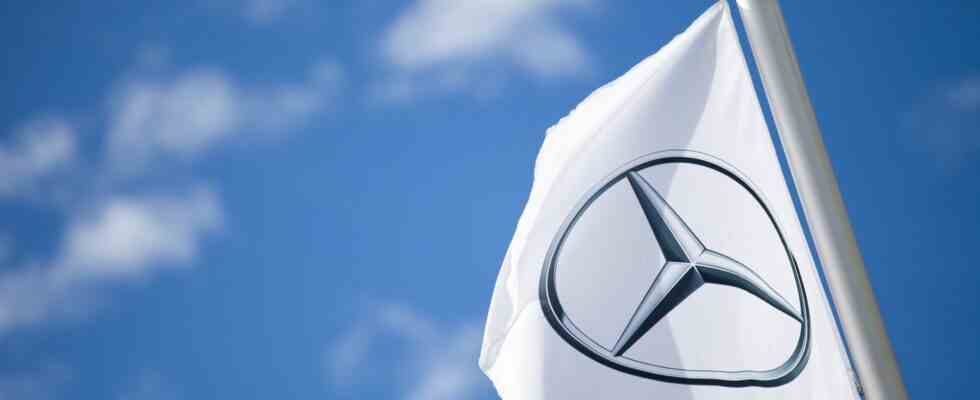Status: 10/26/2022 4:05 p.m
Mercedes-Benz sells its remaining shares in Russia to a local investor. The group has already stopped exporting vehicles to Russia and local production. CFO Wilhelm spoke of a “consistent step”.
The German automobile manufacturer Mercedes-Benz is selling its remaining shares in Russia to a local investor. The sales company and the car assembly plant with more than 1000 employees are to be sold to the Russian investor Avtodom, the DAX group announced. CFO Harald Wilhelm added that the step would not have any additional financial consequences.
However, completion of the transaction is still subject to official approvals. Wilhelm spoke of a “consequent step” after the company had already stopped exporting vehicles to Russia and local production at the beginning of March after the Russian attack on Ukraine began.
In the first half of the year, the suspension of business in Russia in response to the Ukraine war and the associated EU sanctions resulted in expenses of EUR 700 million. Since there are no other effects, Mercedes expects neither depreciation nor income from the sale.
Russia business sold for one euro
The French car company Renault recently sold its Russian business for one ruble. His partner Nissan from Japan gave the Russian activities to a Russian state company for one euro and had to write off the equivalent of around 685 million euros. Nissan and Renault negotiated a buyback clause within six years. Mercedes-Benz is also said to have secured a buyback option.
However, other companies are currently having greater problems completely breaking away from the Russian market. Just yesterday, SAP CFO Luka Mucic said that the software company had not completely withdrawn from its Russian business by the end of the year as planned. The company blames legal requirements that exist for customers and employees.
Conditional
Mercedes-Benz in Russia has already confirmed that the company will leave the Russian market. The primary goal of the deal with Avtodom was to fulfill the obligations towards customers and employees of Mercedes-Benz. There was no information on the financial side of the agreement.
The Russian Ministry of Industry and Trade said that Avtodom could “attract” other companies to “organize” joint production at the Yesipovo plant near Moscow. The plant only opened in 2019, at that time in the presence of Russian President Vladimir Putin and former Economics Minister Peter Altmaier. At the time, Putin said that he would do everything to ensure that the company would not regret its involvement in Russia. The production facility was built for around 250 million euros.
net profit doubled
The automaker also released its quarterly figures today. From July to September, Mercedes-Benz doubled its net profit to almost four billion euros. It thus exceeded expectations on the financial market. Sales in the three months rose by 19 percent year-on-year to almost 40 billion euros.
According to the company, the reason for the “solid” economic result is robust demand and the implementation of higher prices.
“In combination with the ongoing cost discipline, we are making the company more resilient and thus also setting the pace for the coming months,” said Wilhelm. Should inflation in the cost of raw materials, for example, get even higher, additional efficiency measures would be necessary, he added, without giving details. Further jobs are to be cut in administration and not in production.
Mercedes benefits from special situation
Mercedes-Benz had increased car deliveries in the summer by more than a third to around 530,000 vehicles and was thus able to iron out the previous slump. Above all, the China business, which no longer suffered so badly from corona lockdowns, boosted the sales figures.
Mercedes-Benz also continues to benefit from a special situation: since there is a lack of supply due to the chip crisis, the Swabians can achieve higher prices and, when it comes to orders, they concentrate primarily on expensive, highly profitable top models such as the S-Class. Group boss Ola Källenius also trims the brand for luxury and focuses on class instead of mass. The company is already breaking even with sales of one to one and a half million vehicles compared to two million before the Corona crisis, said Wilhelm.
No reduction in prices in sight
The company wants to defend its higher new car prices even if demand is weaker in the coming year. “We have no intention of lowering list prices and no intention of increasing incentives,” said CFO Wilhelm. Even with the foreseeable recession in Europe, the brand with the star “definitely wants to try to protect the margins” instead of pushing more new cars onto the market with higher discounts. As of now, however, demand is good worldwide, Wilhelm added.
According to analysts, the third quarter went well, so there is still optimism for the current final quarter. But skepticism about the prospects for 2023 is growing in view of the energy crisis in Europe caused by Russia’s war against Ukraine, high inflation and rising interest rates, as well as only slowly easing disruptions in supply chains, for example in the chip supply. Mass manufacturers such as Volkswagen and Stellantis expect sales figures to fall in the coming year. And Audi boss Markus Duesmann also sees the first signs of a decline in orders in Europe.
The car manufacturers should hang the good quarterly balance sheets for the second half of 2022 on the wall, advised car analyst Patrick Hummel from the Swiss bank UBS. They would have to lower prices next year, and profits could collapse.

